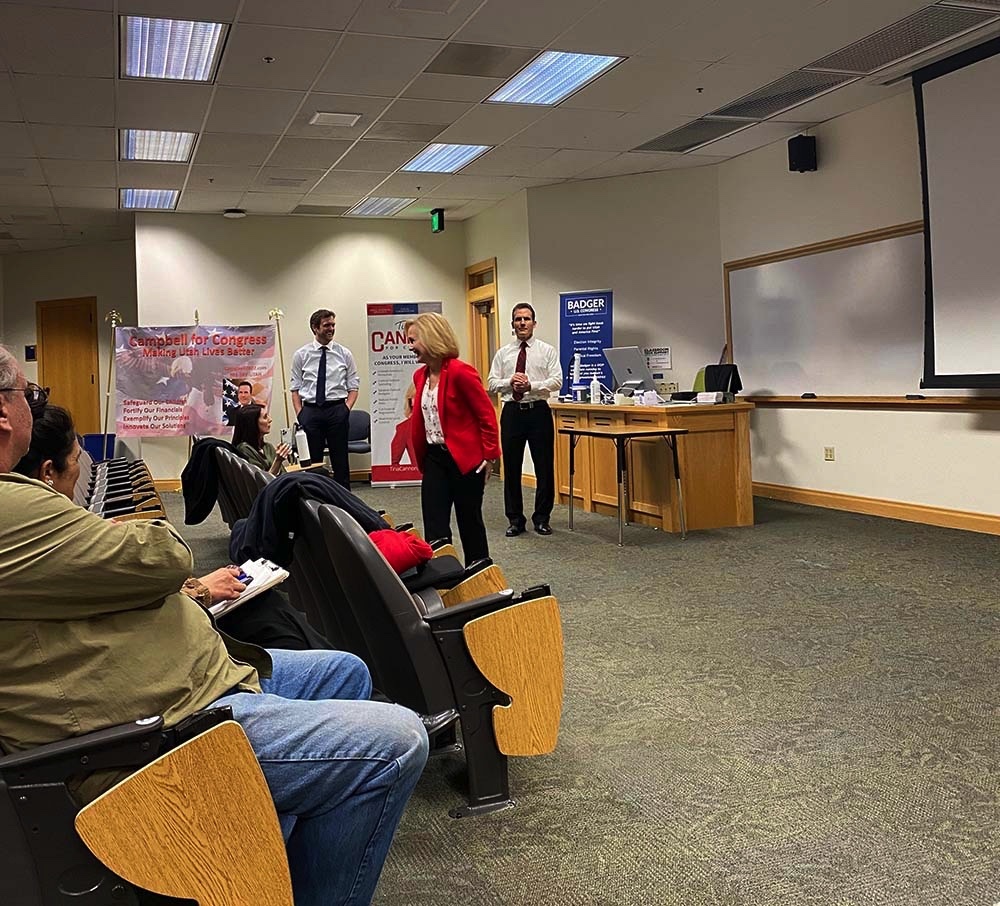USUSA College Republicans Club hosts Meet the Candidates event
On March 2, the Utah State University Student Association College Republicans Club hosted Meet the Candidates to allow USU students to learn more about Utah’s congressional candidates and their views.
Four congressional candidates attended, including the three republican non-incumbent candidates running for Utah’s 1st Congressional District.
The fourth candidate, Ally Isom, is running for a seat in the U.S. Senate.
Andrew Badger, the first to speak, said his decision to run was mainly fueled by the U.S. leaving Afghanistan in August. He said the decision to leave was a sign of weakness.
“Seeing the absolute catastrophe that was Afghanistan really brought home to me just what the stakes are,” Badger said. “Wars don’t end because you decide to. The enemy has a say.
Badger said his main initiatives as a Utah representative would be to achieve national resiliency. He explained this would involve revitalizing the economy, decoupling from China, becoming self-reliant, restoring a manufacturing base and regaining energy independence.
To accomplish these initiatives, Badger plans to get rid of drilling permits on federal lands, open the Keystone XL pipeline, and work to get the U.S. out of the Paris Climate Accords.
He also expressed concern over vaccine mandates.
“Some issues that aren’t being addressed by our current representatives are around medical freedom, the simple premise that we are individually sovereign,” Badger said. “The government can’t force us to take vaccines.”
William Campbell, another candidate for the district’s seat in the House, addressed many of the same issues.
“The federal influences are not positive for what’s happening,” Campbell said. “Part of what I see as my role is eliminating or reducing the federal influences so everyone can have more control over their own lives.”
Campbell, who cited years of experience working in the private sector with people of other political ideologies, said his initiatives are to safeguard children, fortify financials, exemplify his district’s principles and innovate solutions.
The third candidate for the House, Tina Cannon, talked about her concerns with the way money is being spent by the government.
Cannon worked in the aerospace and ski industries before beginning a career as a tax accountant. Through that perspective, she doesn’t believe the current tax system to be effective.
“There is no logic in tax,” Cannon said. “This is all politics. It is a political system in a tax policy.”
Cannon went on to share her father-in-law’s experiences with the U.S. Department of Veterans’ Affairs to voice her concern with the lack of efficacy in the organization.
“He’s 88 today. His body still feels the impact of his service. I’ve been in the VA system,” Cannon said. “I’ve stood there through his cancer treatment and I can tell you what the VA health care system is and is not, and we can and we should do better for our veterans.”
Cannon also recalled her time serving in local politics through the GOP as experience that has prepared her to be a representative for Utah on a national level.
Isom, a candidate running for the U.S. Senate seat currently held by Mike Lee, was the last person to present her platform to the attendees.
Isom said her time working for The Church of Jesus Christ of Latter-day Saints and as former Gov. Gary Herbert’s chief of staff have helped her to become a principled collaborator.
“I understand the way you bring people to the table is — You invite them first of all. You say, ‘You matter.’ You listen to them,” Isom said. “You find their story out and you give them vocabulary to have a neutral conversation.”
She was the only candidate in her race who has experience in the private sector and explained how she came to believe innovation is stifled by regulation when the company she worked for tried to pass an antimicrobial antiseptic through the EPA and FDA.
“We were told it would cost $800 million for us to get an antimicrobial therapeutic through the FDA,” Isom said.
She said she committed to spending no longer than two terms as senator because she said politicians change after spending too much time in the District of Columbia.
If elected, providing affordable housing in Utah will be one of Isom’s top priorities. She plans on doing so by providing the necessary resources to the state.
“I’m a big believer that you should block grants back to states and let states make decisions,” Isom said. “There’s money being allocated in Washington, D.C. and it’s very narrowly prescribed what will be done with that money. What I’d rather do is give the chunk back and let the state decide how to spend and customize it — tailor it — to local communities.”
Isom also believes there are people within opposing political parties who are willing to work with one another.
“The first thing I plan to do is go meet every single one of my colleagues and find out what matters to them and find out their story,” Isom said. “When you sit down and say, “What’s your story,” the hard stuff comes out and you start to connect on a deeper level. And you can get things done when there’s trust between people.”
Ryan Smith, the president of College Republicans, is satisfied with how the event turned out.
“I think the event went well,” Smith said. “It was a great opportunity for students to learn about the different candidates running for congress.”
-Brock.Marchant@usu.edu

